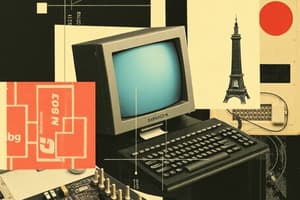Podcast
Questions and Answers
What is a computer?
What is a computer?
An electronic device that receives data, processes data, stores data, and produces a result.
Which of these are basic parts of a computer? (Select all that apply)
Which of these are basic parts of a computer? (Select all that apply)
- Keyboard (correct)
- Printer
- Monitor (correct)
- System unit (correct)
What are the four broad categories of a computer system?
What are the four broad categories of a computer system?
Input, Processing, Storage, Output
Computers can perform millions or billions of calculations in a fraction of a second, measured in ______.
Computers can perform millions or billions of calculations in a fraction of a second, measured in ______.
Computers are reliable machines that perform inconsistently over time.
Computers are reliable machines that perform inconsistently over time.
What is one of the benefits of using computers in business?
What is one of the benefits of using computers in business?
How do computers benefit the education system?
How do computers benefit the education system?
Match the following fields with their uses of computers:
Match the following fields with their uses of computers:
Computers can share resources with other devices.
Computers can share resources with other devices.
Flashcards are hidden until you start studying
Study Notes
What is a Computer?
- A computer is an electronic device that receives data (input), processes data, stores data, and produces a result (output).
- Basic components include the system unit, keyboard, monitor, and mouse.
Computer System
- A computer system consists of multiple electronic components categorized into four parts: input, processing, storage, and output.
- Input: Provides data to the computer (keyboard, mouse, touchscreen)
- Processing: Moves and processes data inside the computer (CPU, memory, sound card)
- Storage: Stores software and data (hard drive, USB Flash drive, optical device)
- Output: Provides results to the user (monitor, projector, printer)
Characteristics of Computers
- High Speed: Computers can perform millions or billions of calculations in a fraction of a second.
- Storage: Computers use different types of memory storage to keep data and information, ranging from large capacity to fast retrieval.
- Accuracy: Computers are 100% accurate in calculations; errors usually come from data input or software issues.
- Reliability: Computers are reliable machines, with hardware and software components designed for consistent performance and easy maintenance.
- Versatility: Computers can perform multiple tasks simultaneously with ease.
- Diligence: Computers do not experience tiredness or lack of concentration. They can work continuously without errors.
- Resource Sharing: Computers can connect to other devices and share resources, such as printers and hard drives.
Benefits and Usage of Computers
- Business: Used for payroll, sales, budget planning, financial management, and information systems.
- Banking: Dependent on computers for online transactions, tracking records, and automated services like ATMs and CDMs.
- Government: Used for passport and visa systems, driving licensing, traffic systems, and national ID systems.
- Military: Used in defense and many military weapons have computerized control systems.
- Healthcare: Used for keeping patient health records, medicine history, and controlling equipment in laboratories.
- Education: Vital tools for E-learning, student information systems, and teacher and student evaluation systems.
- Communication: Enables easy communication through email, chatting, and video conferencing.
Studying That Suits You
Use AI to generate personalized quizzes and flashcards to suit your learning preferences.




